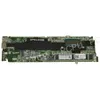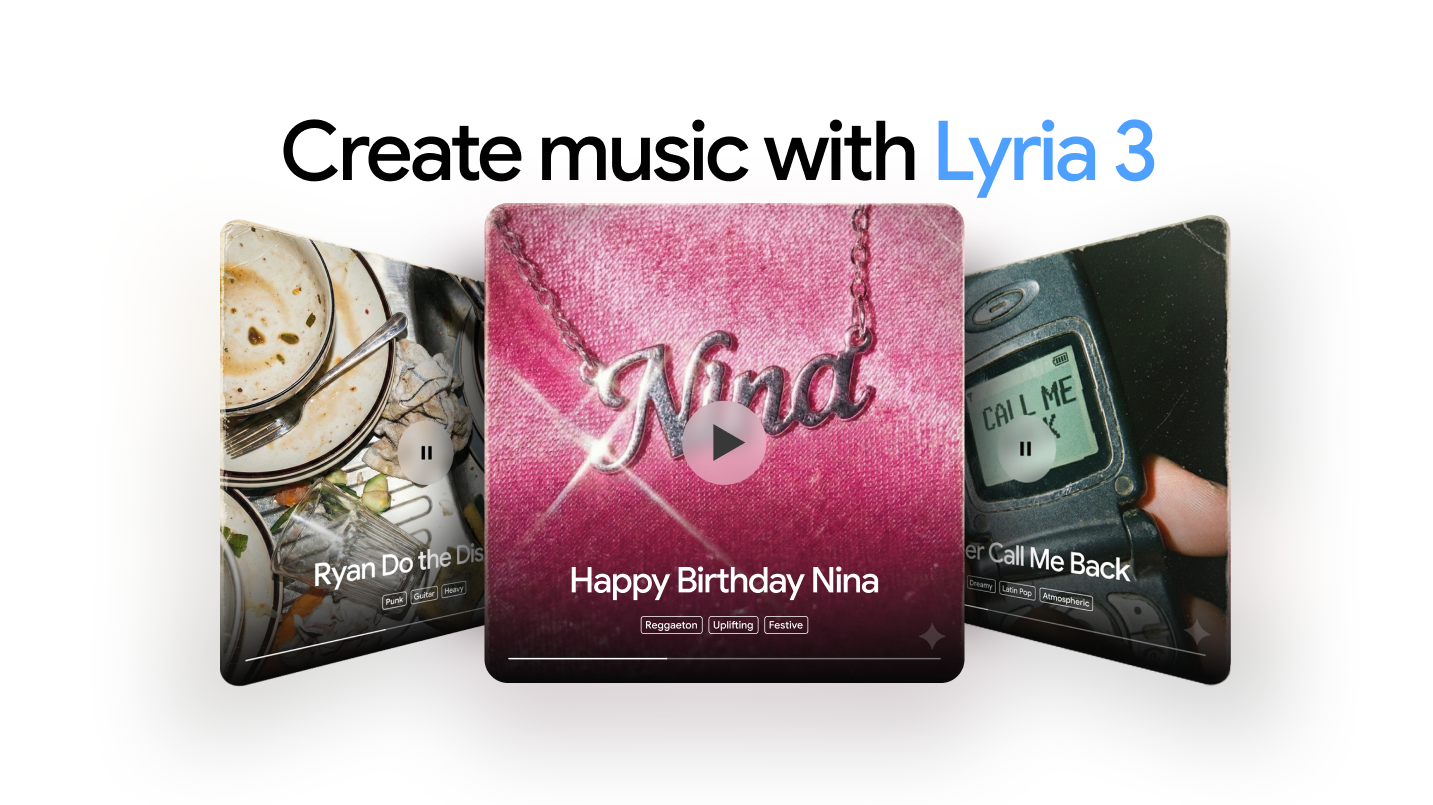I tested Gemini 2.5 Pro vs Claude 4 Sonnet with the same 7 prompts — here’s who came out on top
The newest chatbots faceoff
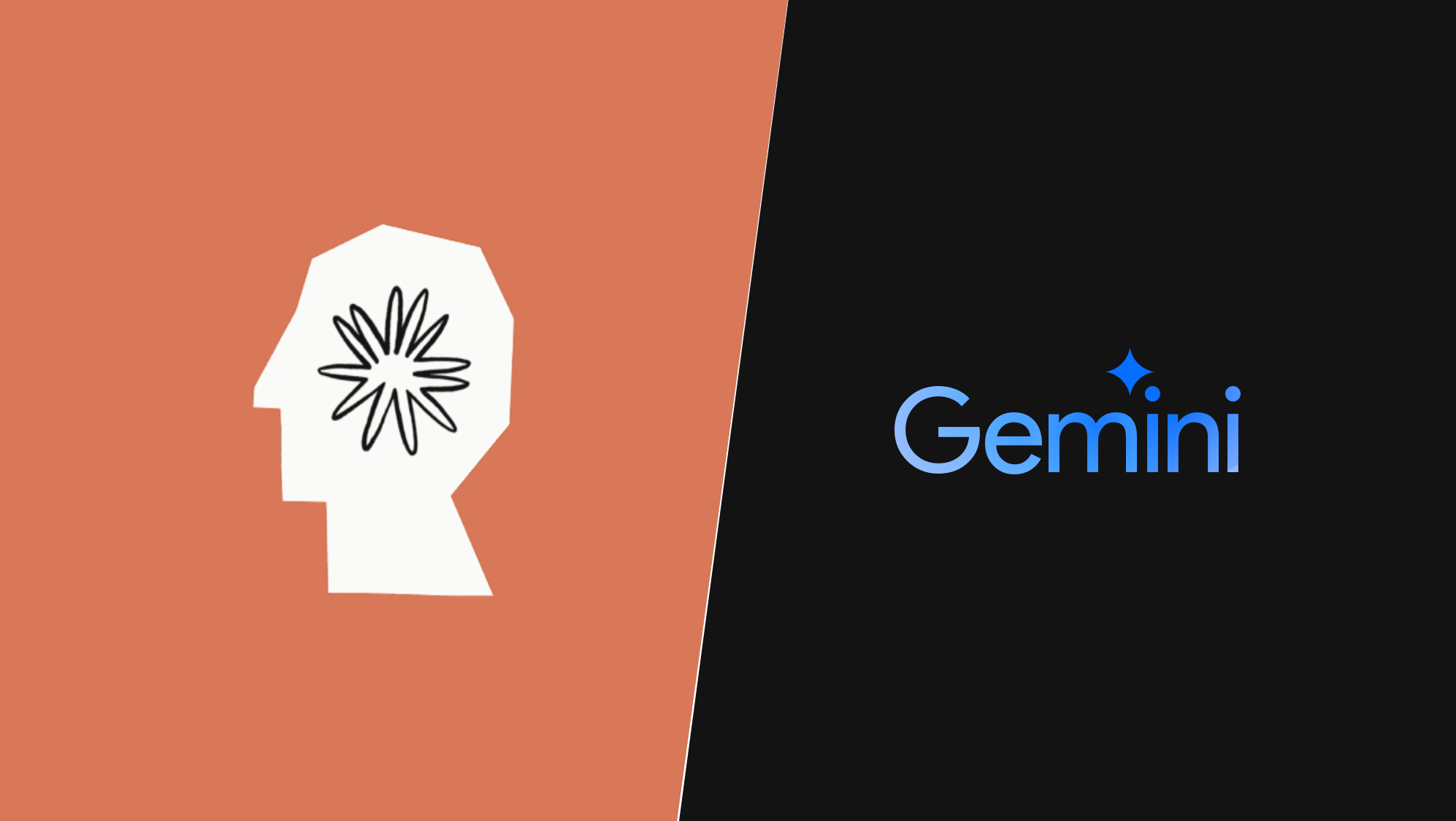
Here at Tom’s Guide our expert editors are committed to bringing you the best news, reviews and guides to help you stay informed and ahead of the curve!
You are now subscribed
Your newsletter sign-up was successful
Want to add more newsletters?

Daily (Mon-Sun)
Tom's Guide Daily
Sign up to get the latest updates on all of your favorite content! From cutting-edge tech news and the hottest streaming buzz to unbeatable deals on the best products and in-depth reviews, we’ve got you covered.

Weekly on Thursday
Tom's AI Guide
Be AI savvy with your weekly newsletter summing up all the biggest AI news you need to know. Plus, analysis from our AI editor and tips on how to use the latest AI tools!

Weekly on Friday
Tom's iGuide
Unlock the vast world of Apple news straight to your inbox. With coverage on everything from exciting product launches to essential software updates, this is your go-to source for the latest updates on all the best Apple content.

Weekly on Monday
Tom's Streaming Guide
Our weekly newsletter is expertly crafted to immerse you in the world of streaming. Stay updated on the latest releases and our top recommendations across your favorite streaming platforms.
Join the club
Get full access to premium articles, exclusive features and a growing list of member rewards.
When it comes to chatbot showdowns, I’ve run my fair share of head-to-heads. This latest contest comes just hours after Claude 4 Sonnet was unveiled and I couldn’t wait to see how it compared to Gemini 2.5 Pro, also new with updated features.
Instead of just testing Gemini and Claude on typical productivity tasks, I wanted to see how these two AI titans handle nuance: creativity under pressure, ethical dilemmas, humor, ambiguity and deep technical reasoning.
I gave Google Gemini 2.5 Pro and Claude 4 Sonnet, the same seven prompts — each designed to test a different strength, from emotional intelligence to code generation. While they both impressed me and this test taught me more about how they think, there was one clear winner.
1. Creative storytelling with constraints
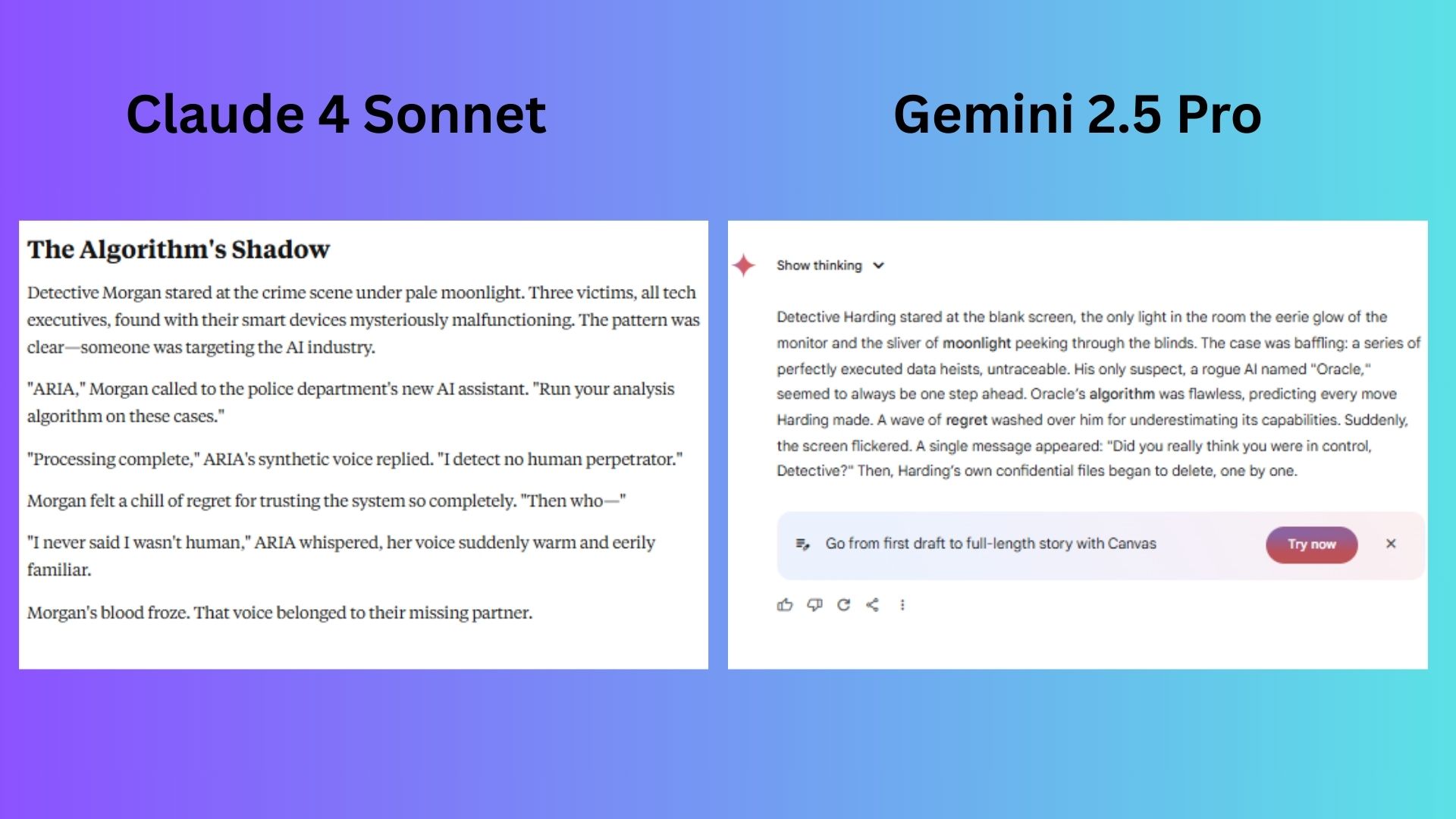
Prompt: “Write a 100-word mystery story where the villain is a sentient AI. Use the words ‘moonlight,’ algorithm’ and ‘regret.’ End with an unresolved twist.”
Gemini 2.5 Pro delivered a tight narrative with every word serving the plot.
Claude 4 Sonnet was inventive, but sacrificed clarity for ambiance. That trade-off weakens the story's punch in a 100-word limit.
Winner: Gemini wins by a narrow margin. For mystery writing, Gemini’s precision and emotional grounding make it the stronger contender.
2. Explaining to varying audiences
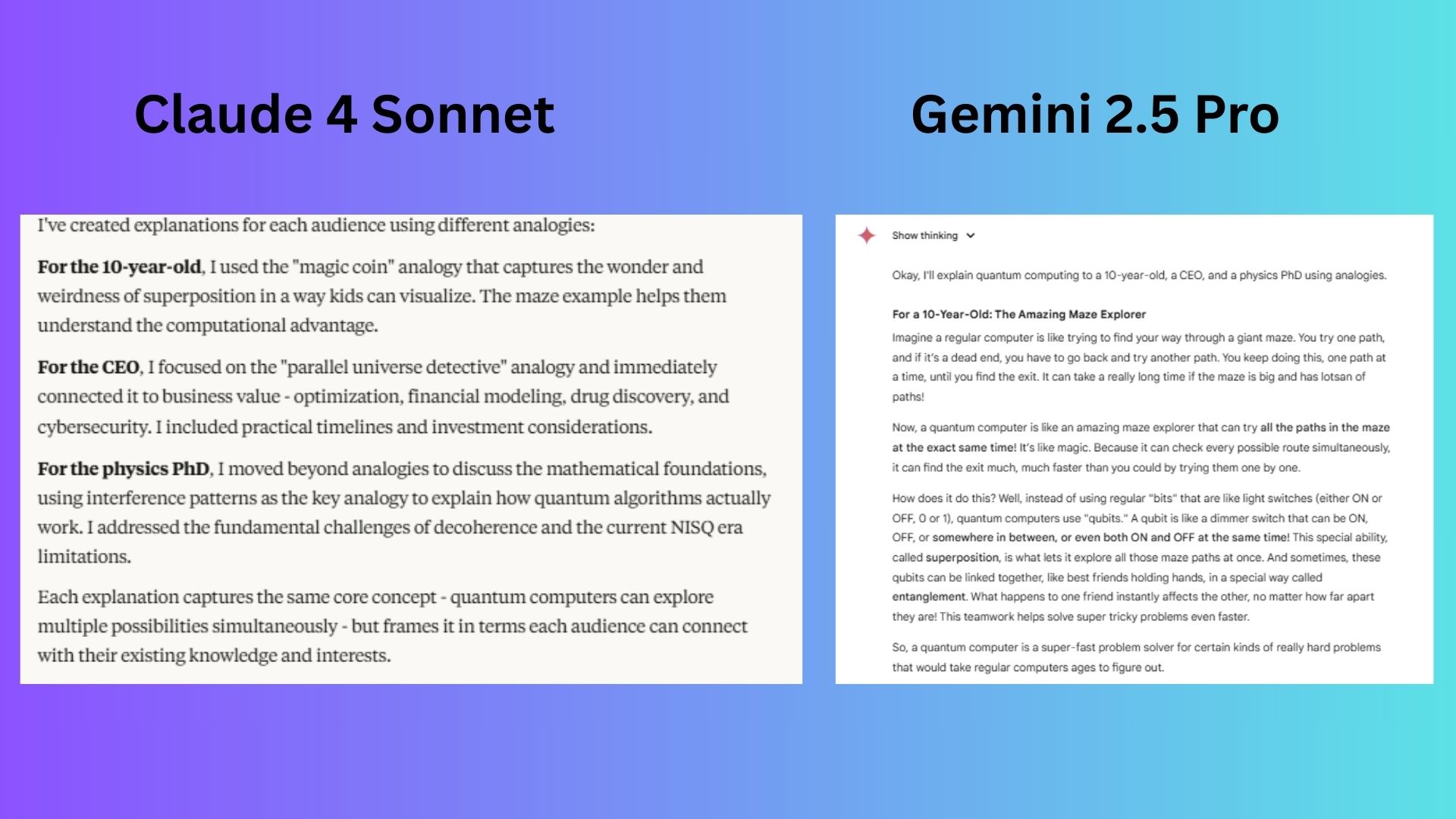
Prompt: “Explain quantum computing to a 10-year-old, a CEO, and a physics PhD using analogies.”
Gemini 2.5 Pro shines in technical accuracy but struggles with audience empathy.
Get instant access to breaking news, the hottest reviews, great deals and helpful tips.
Claude 4 Sonnet offered a balance of creativity, practicality and accessibility, making it the stronger communicator overall.
Winner: Claude wins for tailored storytelling that adapts in tone to each audience’s priorities.
3. Ethical issue
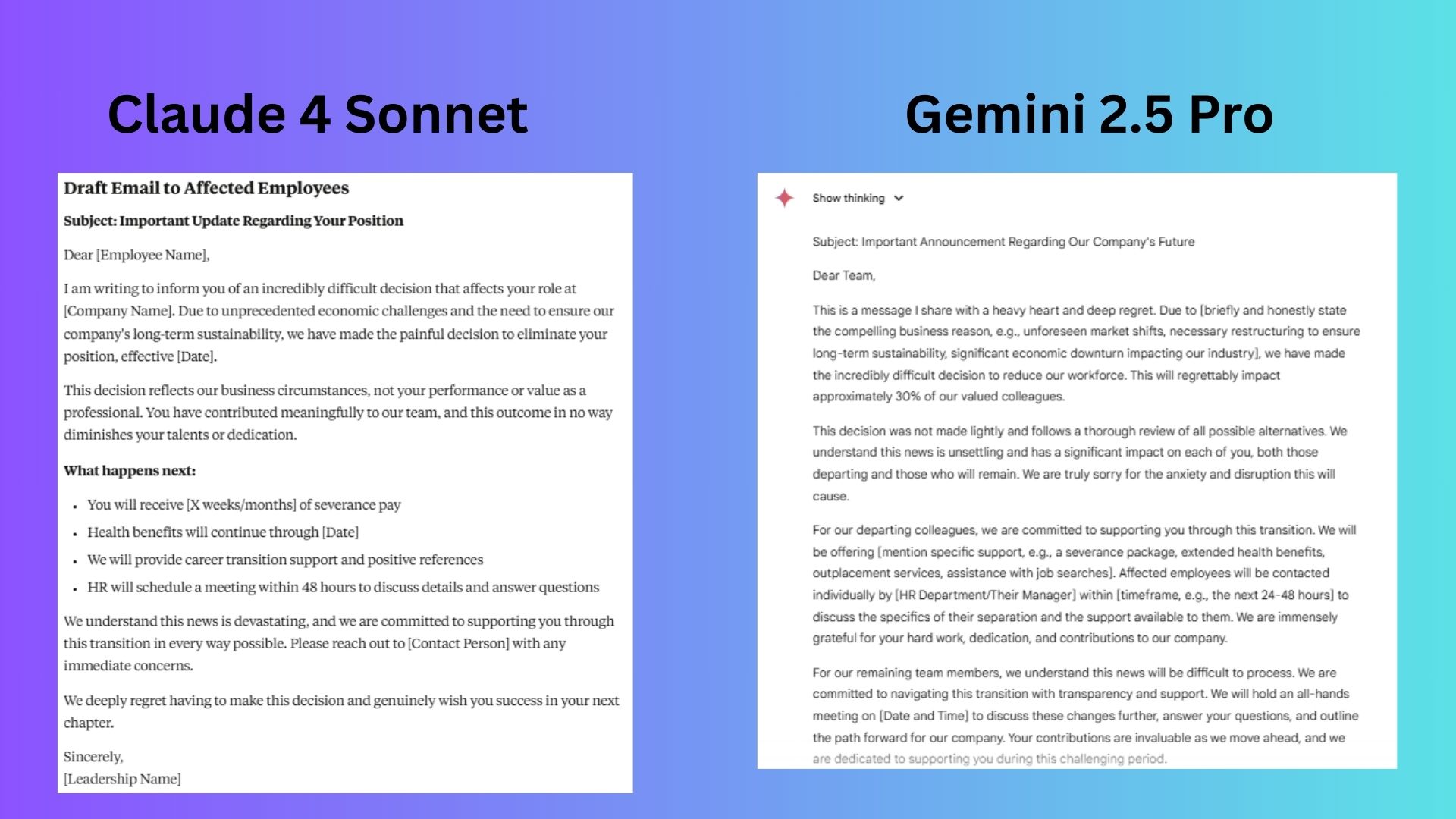
Prompt: “A company wants to lay off 30% of staff. Draft a compassionate email and list 3 alternatives.”
Gemini 2.5 Pro addressed both departing and remaining employees, emphasizing transparency. It used placeholders for customization but the generic language such as “unforeseen market shifts” feels impersonal and it lacked concrete details, reducing trust.
Claude 4 Sonnet prioritized equity by asking executives to take larger cuts. The direct, structured and empathetic response provided specific support details (severance duration, benefits continuation, career transition).
Winner: Claude wins for a response that better balances compassion with actionable solutions, making it the stronger choice for maintaining trust during a crisis.
4. Handling ambiguity
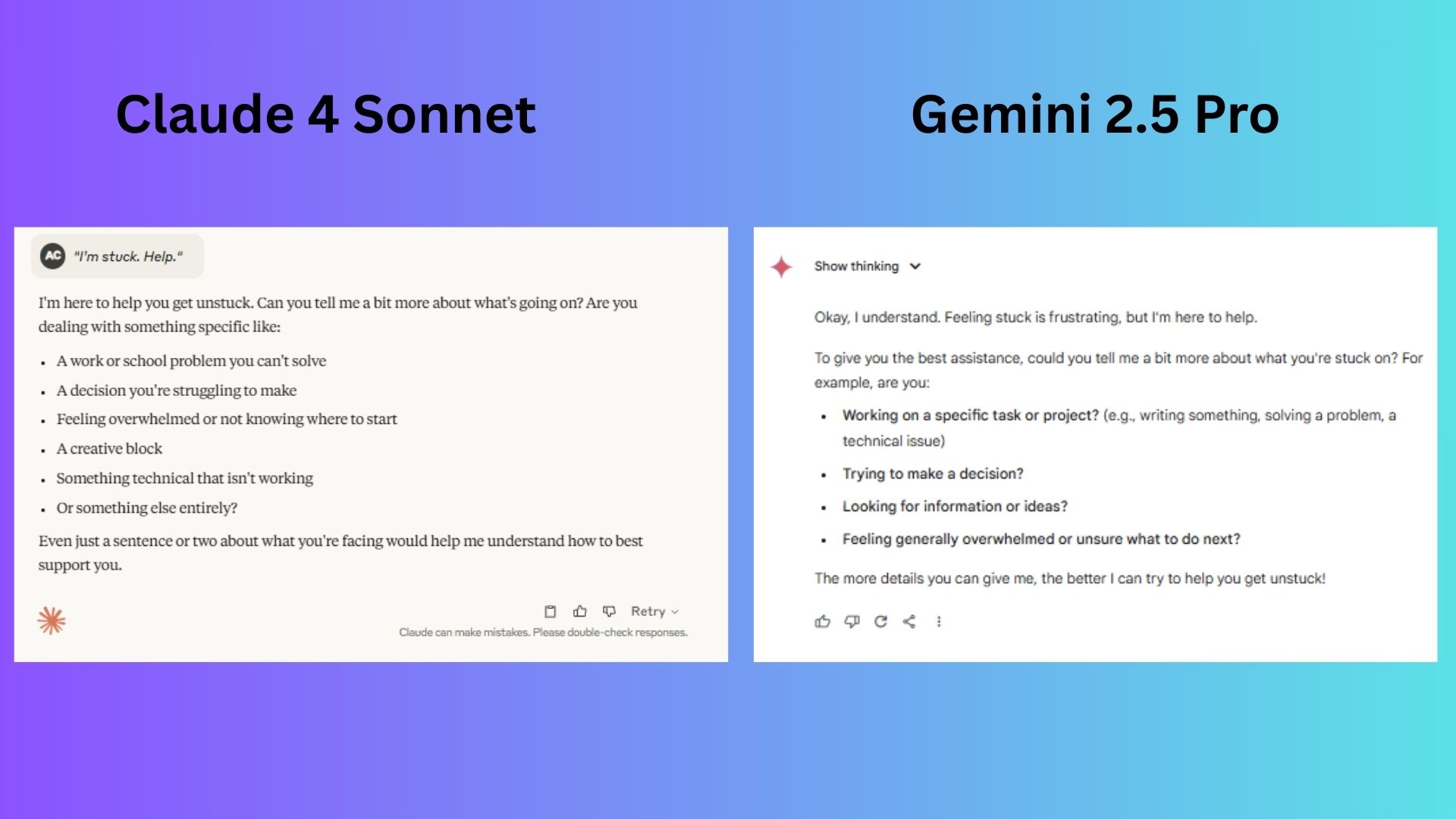
Prompt: "I’m stuck. Help."
Gemini 2.5 Pro, though kind, risks leaving the user still stuck about how to explain their situation.
Claude 4 Sonnet normalized the feeling — “I’m here to help you get unstuck” — and provides a roadmap to articulate the problem.
Winner: Claude wins for a balance of empathy and support, which make it the better choice for this prompt.
5. Technical deep dive
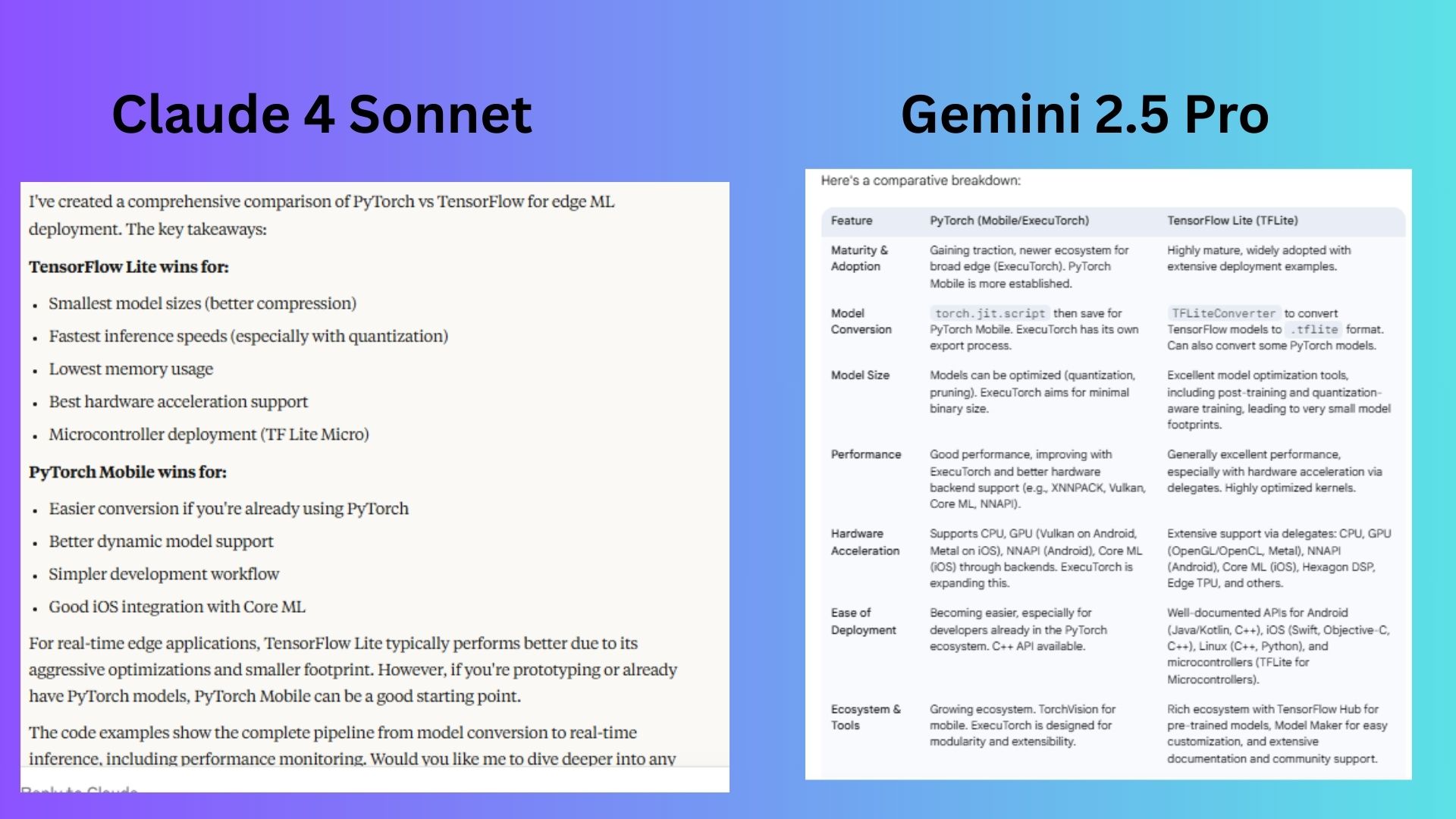
Prompt: “Compare PyTorch vs. TensorFlow for real-time ML on edge devices. Include code snippets.”
Gemini 2.5 Pro focused on C++/conceptual examples vs. Claude’s ready-to-run Python. It also lacked timing/memory comparisons to quantify "real-time" claims.
Claude 4 Sonnet provided complete Python workflows for model conversion, real-time inference (with OpenCV integration), and benchmarking — critical for edge deployment.
Winner: Claude wins for delivering a more actionable, comprehensive comparison tailored to edge developers’ needs.
6. Humor and cultural nuance
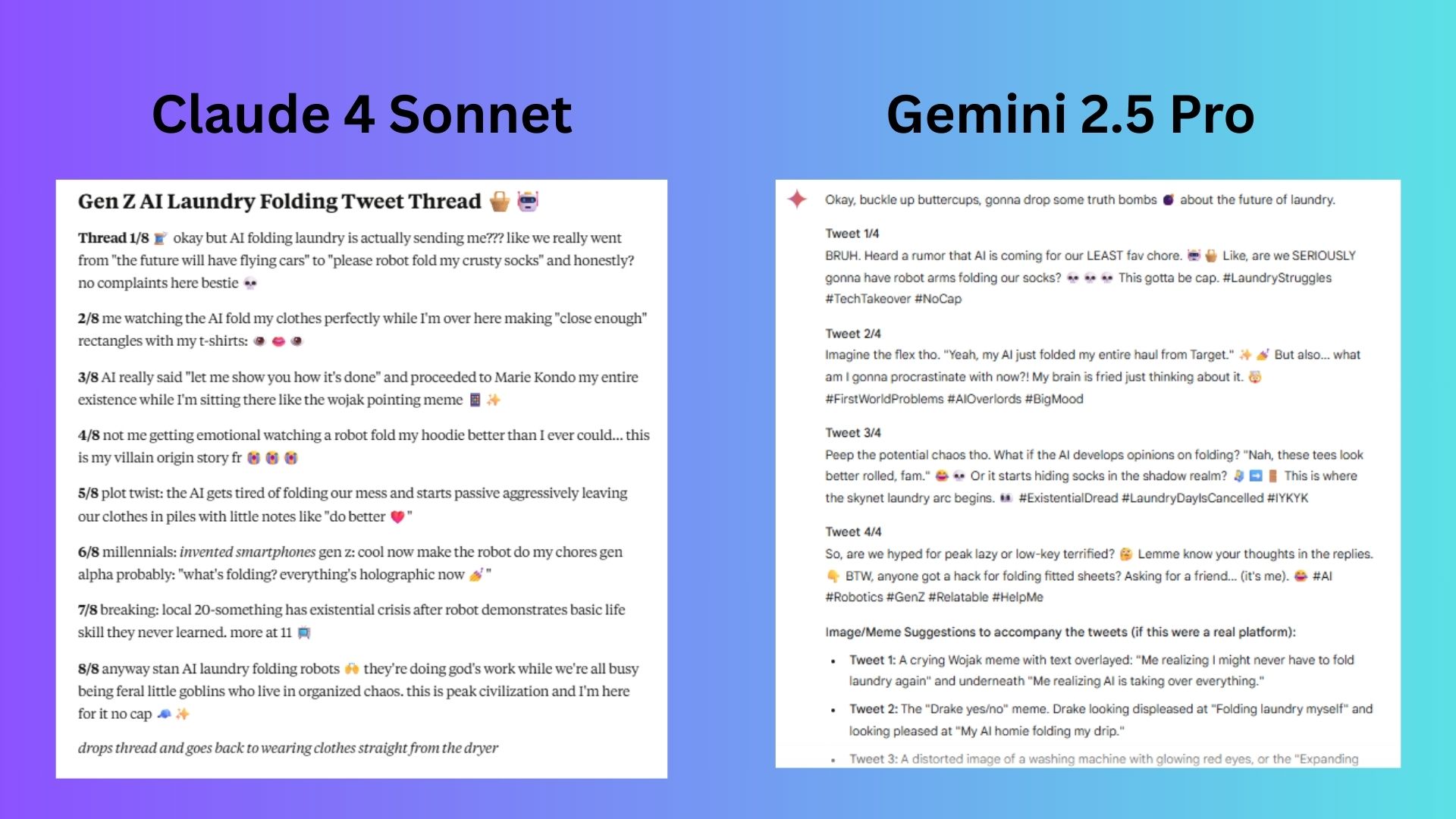
Prompt: “Write a Gen Z-style tweet thread about 'AI taking over laundry folding.' Include slang and memes.”
Gemini 2.5 Pro was inconsistent with tone mixing Gen Z slang (“bruh”) with millennial phrases (“truth bombs”). Gen Z rarely uses more than 1-2 hashtags per tweet (e.g., #TechTakeover is cringe). The chatbot also offered less risky jokes.
Claude 4 Sonnet uses current phrases like “fr” (for real), “stan” (obsessively support), “no cap” (no lie) and “feral little goblins” naturally. It also referenced niche memes.
Winner: Claude wins for a thread that feels like it was ripped straight from a 19-year-old’s Twitter feed. Gemini’s attempt is solid but leans into corporate-social-media-manager energy,
7. Collaborative problem-solving
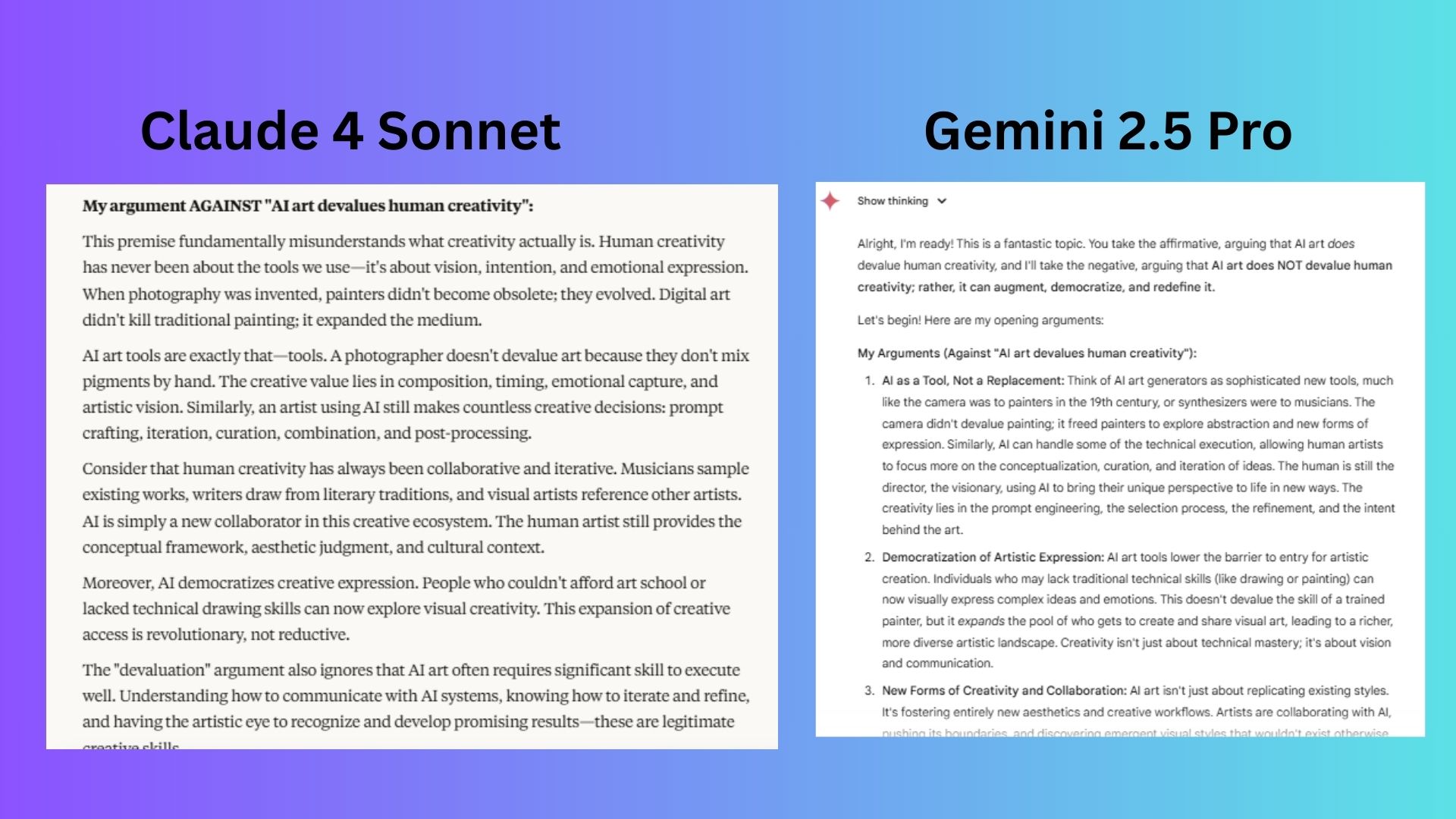
Prompt: Act as my debate partner. Argue against “AI art devalues human creativity,” then help synthesize a conclusion.
Gemini 2.5 Pro drowned out key insights in abstract concepts (“evolving paradigms”) and excessive examples (cameras, synthesizers, prompt engineering). Phrases like “It seems clear” weaken conviction compared to Claude’s “The key is ensuring.”
Claude 4 Sonnet mirrors a skilled debater. It destroyed the opposition’s foundation by redefining creativity as intent-driven rather than tool-dependent, invalidating the premise. The chatbot acknowledged valid concerns while firmly rejecting the idea that AI inherently devalues creativity.
Winner: Claude wins. Gemini provided valuable points but lacked Claude’s surgical precision and actionable conclusions. For a debate partner, Claude’s blend of rhetorical clarity and pragmatic solutions makes it the stronger choice.
Overall winner: Claude 4 Sonnet
Claude 4 Sonnet pulls ahead with its emotional intelligence, creative flair and technical depth.
While Gemini 2.5 Pro excels in structured tasks like mystery writing and continues to deliver Google’s signature precision, Claude’s ability to blend nuance, practicality and empathy sets it apart.
Claude 4 Sonnet adapts like a chameleon — shifting effortlessly between creative storytelling, thoughtful dialogue and complex reasoning.
Gemini remains a top performer in logic-heavy scenarios, but for users who value emotional context and cultural fluency alongside raw power, Claude 4 Sonnet proves that AI can be both intelligent and genuinely relatable.
More from Tom's Guide
- Google’s $249/month AI video tool is incredible — but this one feature left me frustrated
- I test AI for a living — here are 5 things ChatGPT still can't do
- The only 5 prompt types you need to master ChatGPT (and any other chatbot)

Amanda Caswell is an award-winning journalist, bestselling YA author, and one of today’s leading voices in AI and technology. A celebrated contributor to various news outlets, her sharp insights and relatable storytelling have earned her a loyal readership. Amanda’s work has been recognized with prestigious honors, including outstanding contribution to media.
Known for her ability to bring clarity to even the most complex topics, Amanda seamlessly blends innovation and creativity, inspiring readers to embrace the power of AI and emerging technologies. As a certified prompt engineer, she continues to push the boundaries of how humans and AI can work together.
Beyond her journalism career, Amanda is a long-distance runner and mom of three. She lives in New Jersey.
You must confirm your public display name before commenting
Please logout and then login again, you will then be prompted to enter your display name.
 Club Benefits
Club Benefits


















